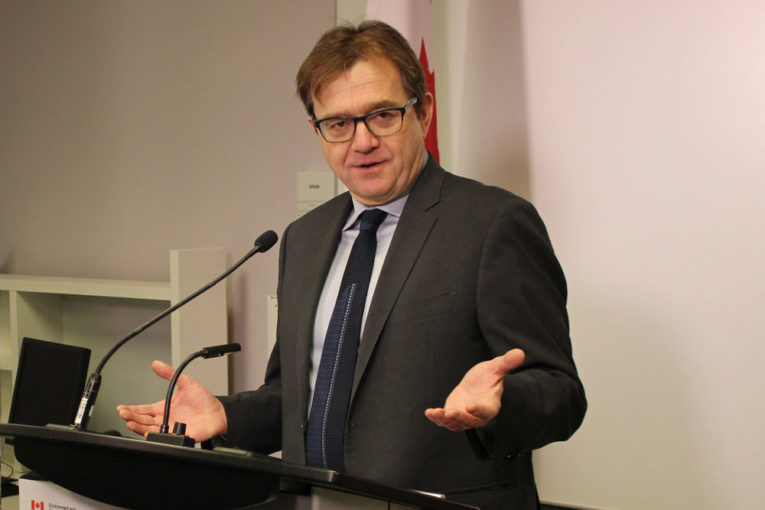
CALGARY – Indigenous leaders in Alberta say they are “frustrated” and “insulted” after First Nations protestors in British Columbia asked the federal government to reject Teck Resources Ltd.’s $20.6-billion Frontier oilsands project.
Protestors gathered at Environment and Climate Change Minister Jonathan Wilkinson’s office in North Vancouver Monday to demand the massive mining project, planned for an area north of Fort McMurray, be rejected. Wilkinson has the authority to approve the project, which was recommended for approval last summer.
“We’re here to stand in opposition to the Teck Frontier massive development in the tar sands,” said Grand Chief Stewart Phillip of the Union of B.C. Indian Chiefs said at the protest outside of Wilkinson’s office.
Vancouver-based Teck Resources is expecting a decision from federal cabinet on the new oilsands mine next month. Ahead of that deadline, however, pressure is building in both Alberta and B.C. to either approve or reject the project.
“The Teck mine will affect our community even though it is hundreds of miles away from our community,” said Kanahus Manuel with the Tiny House Warriors, which also opposes the Trans Mountain pipeline expansion that will transport oilsands and heavy oil from Alberta to the B.C. coast.
Manuel said the Teck Frontier project does not have the consent of her community in central B.C. to proceed.
Teck, which did not respond to a request for comment, has previously announced that it has signed benefits agreements with “all 14 Indigenous communities in the broader Frontier project area.”
Frontier is a massive oilsands mining project planned in a region north of Fort McMurray that would eventually produce 260,000 barrels of oil per day – an undertaking that would take 7,000 people to build and 2,500 people to operate.
Indigenous communities directly impacted by the project have been vocal in their support of the development.
“People underestimate this region and think that our Indigenous communities in this region are just here to cash a cheque. That’s just not the case,” Ron Quintal, president of the Fort McKay Metis Nation, which has signed an agreement with Teck.
Quintal said it was “frustrating” that groups outside the region are calling on the project to be rejected after his community and others in northern Alberta had contracted independent researchers from across Canada during the consultations process.
In addition, he said, the Metis and other Indigenous groups in the area have gone all the way to the Supreme Court of Canada to fight other resource projects in the past that they didn’t believe were appropriate for the area.
It’s borderline insulting to … these Indigenous groups who are mitigating and going over these projects with a fine-toothed comb
Ron Quintal, president, Fort McKay Metis Nation
“It’s borderline insulting to these Indigenous leaders and these Indigenous groups who are mitigating and going over these projects with a fine-toothed comb,” Quintal said.
“If we’re looking at true reconciliation and our rights and asking the government to honour that, then we need to also honour each other from that perspective,” Quintal said. “In this circumstance, we have 14 communities that have used a democratic process in order to achieve these agreements.
“If we want Canada to respect us, we want the provinces and municipalities to respect us, then we need to give each other respect at the same time,” he said of other communities demanding the government cancel the project.
Still, pressure is building on the federal government to make a decision on the project. Last week, Finance Minister Bill Morneau said the project was not on the agenda at an upcoming federal cabinet meeting, indicating that a decision was not imminent.
Sabrina Kim, a spokesperson for Wilkinson, said the government’s deadline for making a decision on the project was the end of February.
“The government will consider a range of factors when they make a decision, including our commitments to achieving net-zero emissions by 2050, to advancing reconciliation, to creating good-paying middle class jobs, and to growing the economy,” Kim said in an email.
The decision will leave one side of the debate over the project disappointed.
“Minister Wilkinson, you must reject the Teck Frontier mine now,” said Eriel Deranger, the executive director of Indigenous Climate Action and a member of the Athabasca Chipweyan First Nation.
Deranger’s role at Monday’s protest underscores some of the diverse views within First Nations communities on resource development, as the Athabasca Chipewyan is another one of 14 the communities that have signed agreements with Teck.
“We have had positive negotiations with Teck, and we believe that we have an agreement that respects our Treaty rights, and uses innovative approaches to mitigate the impacts on our land, waters and wildlife,” Athabasca Chipewyan First Nation Chief Allan Adam said in a release at the time the agreement with Teck was announced.
Adam did not respond to a request for comment on Monday. He recently asked the Alberta government to become involved in mitigating the effects of the project, which he said he still supported, on wildlife and the environment.
• Email:
You can read more of the news on source
